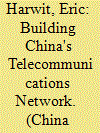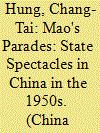|
|
|
Sort Order |
|
|
|
Items / Page
|
|
|
|
|
|
|
| Srl | Item |
| 1 |
ID:
078648


|
|
|
|
|
| Publication |
2007.
|
| Summary/Abstract |
This article uses theories of industrial policy to analyse the growth of China's telecommunications equipment industry over the past 20 years. It highlights the role of the Chinese government in shaping the sector, by first utilizing imported equipment, then promoting Sino-foreign joint ventures and finally fostering domestic companies. Significantly, the government encouraged market competition, and avoided the pitfall of monopoly state control. Today, key telecommunications players include joint ventures, state-owned companies and even a major Chinese private corporation. The article concludes that the government's fiscal and regulatory industrial polices were successful, in that they rapidly built a modern communications network while promoting a vibrant free-market competitive environment
|
|
|
|
|
|
|
|
|
|
|
|
|
|
|
|
| 2 |
ID:
078647


|
|
|
|
|
| Publication |
2007.
|
| Summary/Abstract |
China's rapidly proliferating global interests and evolving political environment have begun to change the international and domestic context for its foreign policy-making. This article explores the changing inputs into and processes associated with foreign policy-making in China today. It does this by analysing the shifting fortunes of "peaceful rise," one of the first new foreign policy concepts to be introduced under the Hu Jintao administration. The authors draw several implications from this narrow debate for understanding contemporary foreign policy-making in China. It provides an example of how new foreign policy ideas and strategies can come from outside the formal, central government bureaucracy, and underscores the growing relevance of think-tank analysts and university-based scholars. Finally, the authors argue that the Chinese leadership's decision to eschew "peaceful rise" in favour of "peaceful development" was fundamentally a question of terminology and thus preserved China's strategy of reassuring other nations.
|
|
|
|
|
|
|
|
|
|
|
|
|
|
|
|
| 3 |
ID:
078683


|
|
|
|
|
| Publication |
2007.
|
| Summary/Abstract |
In today's China, memory of the Sino-Japanese War of 1937-45 is often a front page issue, a source of diplomatic friction between Beijing and Tokyo. Yet in Mao's era, public memory of this conflict virtually disappeared. Only the role of communist forces under Chairman Mao was commemorated; other memories were consigned to historical oblivion. This article examines the process by which memory of the war re-appeared in the reform era. Because the government has emphasized nationalism, the new memory of the war has stressed a patriotic nationalist narrative of heroic resistance. At the same time, a second major theme has been the emphasis on Japanese atrocities, virtually a "numbers game" in historical writing. Thus despite the voluminous publications which have appeared since the 1980s, the new writing on the war has stressed certain themes while neglecting others
|
|
|
|
|
|
|
|
|
|
|
|
|
|
|
|
| 4 |
ID:
078682


|
|
|
|
|
| Publication |
2007.
|
| Summary/Abstract |
Lee Teng-hui, president of Taiwan from 1988 to 2000, played an important role in launching the widespread nationalism in Taiwan today. Since the end of his presidency, Lee has pushed very hard for a separate Taiwan nation, but during his terms of office he moved very cautiously and only announced his "special state-to-state" relationship to describe Taiwan's relations with China after China repeatedly refused to negotiate. Although Lee's efforts at democratization have received widespread affirmation in Taiwan, his efforts in creating Taiwan nationalism have proven more controversial
|
|
|
|
|
|
|
|
|
|
|
|
|
|
|
|
| 5 |
ID:
078684


|
|
|
|
|
| Publication |
2007.
|
| Summary/Abstract |
Political parades in the People's Republic of China are a rich and complex cultural text from which historians can gain a deeper understanding of the nature and policies of the Chinese Communist Party (CCP). The CCP's state spectacles, primarily the parades during the May Day and National Day (1 October) celebrations held in Tiananmen Square in the 1950s, were a well-organized political ritual with multiple purposes: festivals of iconoclasm, demolishing the old order and embracing the new era of socialism; a legitimation of the CCP's authority; a display of myriad achievements under communism; an affirmation of the centrality of Mao's role in modern Chinese revolutionary history; and an announcement of China's presence in the international socialist camp. The parades, although influenced by the Soviet Union, exhibited strong native colours. They also reflected a nation undergoing political and economic changes. In the end, Mao Zedong and his senior Party leaders, acting both as actors and directors, carefully controlled and choreographed the paraders, who were themselves the audience, in Tiananmen Square to heap praise on the achievements of the Party and its chairman
|
|
|
|
|
|
|
|
|
|
|
|
|
|
|
|
| 6 |
ID:
078681


|
|
|
|
|
| Publication |
2007.
|
| Summary/Abstract |
This article explores why the economic caseloads in China have declined in recent years. Based on data collected at the national, provincial and local levels, it evaluates four possible explanations - structural changes in dispute resolution, economic development, social transformation and dysfunctional courts. It suggests that all four hypotheses are plausible to a certain extent but none provides a single, straightforward and adequate solution, and the degree of each factor's impact varies across time and region. The cause for decline must lie either in the total volume of disputes generated in society or in the unwillingness of potential litigants to use the courts. The difficulty of locating an overarching explanation in a way suggests that China's case might have imposed a challenge on the relationship between caseload change and socio-economic conditions which has conventionally been regarded as a settled issue
|
|
|
|
|
|
|
|
|
|
|
|
|
|
|
|
|
|
|
|
|